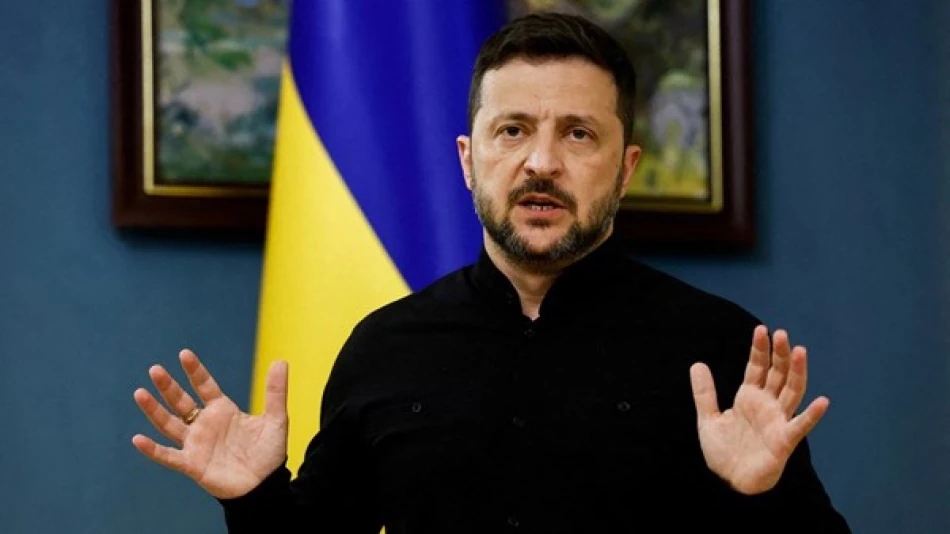
Zelensky Announces Pursuit of Putin Meeting, Seeking Diplomatic Resolution
Putin-Zelensky Summit Talks Hit Reality Check as Trump's 50-Day Deadline Looms
Ukraine's push for a high-level summit between Presidents Volodymyr Zelensky and Vladimir Putin faces mounting skepticism from Moscow, despite progress made during this week's Istanbul negotiations. While Kyiv proposes an August meeting timeline that aligns with Donald Trump's aggressive 50-day ultimatum to Russia, the Kremlin is signaling that fundamental disagreements make any near-term breakthrough unlikely.
Ukraine Sees Summit as War's End Game
Speaking to journalists following the third round of negotiations in Istanbul, Zelensky framed a potential leaders' meeting as the essential catalyst for ending the conflict. "We need to end the war, which probably begins with a meeting between leaders," he stated, describing Russian negotiators' willingness to discuss such a summit as meaningful progress toward "some formula for a possible meeting."
Ukrainian delegation chief Rustem Umerov has proposed scheduling the summit by late August, a timeline that strategically aligns with Trump's public pressure campaign against Putin. The timing suggests Ukraine is betting on American diplomatic leverage to force Russian concessions.
Moscow's Cautious Response Reveals Strategic Calculations
Russia's measured response reflects both tactical positioning and genuine concerns about premature high-level engagement. Kremlin spokesperson Dmitry Peskov acknowledged that "a high-level meeting can and should decisively conclude the settlement process" but questioned whether such complex negotiations could realistically conclude within 30 days.
Putin's insistence on participating only in the "final stage" of negotiations follows a familiar Russian diplomatic playbook—avoiding summits that could lock Moscow into unfavorable positions while maintaining flexibility for future maneuvering.
Trump Factor Adds Urgency and Uncertainty
The Ukrainian strategy appears designed to capitalize on Trump's stated commitment to rapid conflict resolution. By proposing an August timeline that roughly matches Trump's 50-day ultimatum, Kyiv is positioning itself as the cooperative party while potentially forcing Russia to either engage seriously or face enhanced American pressure.
This approach mirrors successful diplomatic precedents where external pressure from major powers accelerated stalled negotiations. However, it also carries risks—if Trump's threats prove hollow or if Russia calls the bluff, Ukraine could find itself in a weaker negotiating position.
Historical Precedent Suggests Cautious Optimism
Previous Russia-Ukraine diplomatic initiatives have often stalled at the implementation phase, even when initial agreements seemed promising. The 2014 Minsk agreements and various ceasefire arrangements demonstrate how tactical agreements can unravel without sustained political will from both sides.
However, the current dynamic differs significantly due to Trump's direct involvement and his stated willingness to impose "harsh sanctions" on Russia if diplomatic progress stalls. This external pressure mechanism was largely absent from previous negotiation rounds.
Market and Geopolitical Implications
For global markets, any genuine progress toward a Putin-Zelensky summit would likely trigger significant volatility in energy, agricultural, and defense sectors. European energy markets remain particularly sensitive to conflict developments, while grain futures continue reflecting supply chain uncertainties.
The proposed August timeline also creates a clear deadline for investors and policymakers to assess whether diplomatic momentum can overcome entrenched military and political positions. Failure to achieve meaningful progress by late summer could signal a return to prolonged conflict dynamics, with corresponding implications for global economic stability and defense spending priorities.
Most Viewed News

 Layla Al Mansoori
Layla Al Mansoori






